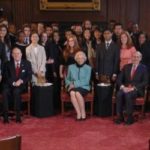Pulitzer prize winning historian Jack Rakove of Stanford discusses the legal history of desegregation, focusing on the analytical problems facing the struggle for desegregation.
A Conversation on Brown v. Board of Education

Supreme Court Justices Stephen G. Breyer, Sandra Day O’Connor and Anthony M. Kennedy discuss with high school students this landmark case that ended racial segregation in schools. They explore the background of the case, the role of Thurgood Marshall, how Brown v. Board of Education was decided, and the events following the unanimous ruling that said that “separate education facilities are inherently unequal.” A PDF lesson plan accompanies this video.
Patriotism Crosses the Color Line: African Americans in World War II
Professor Clarence Taylor reminds us of the role African American soldiers played in the conflict—and the role their military service played in shaping the racial politics that followed in peacetime. This essay helps us appreciate the complexity of mobilization for modern warfare and drive home the impact of events on the world stage upon domestic affairs. Free registration for students and teachers required to access resource.
The Civil Rights Movement: Major Events and Legacies
James Patterson provides an overview of the movement, reminding us that the roots lay in the early twentieth century with the founding of the NAACP and the National Urban League and that efforts to secure equality continued through the 1940s and the postwar years. Patterson shows the variety of arenas in which the modern civil rights movement operated, from the courtrooms and legislative halls of the nation to the streets of Birmingham and the highways of Alabama and Mississippi. Free registration for students and teachers required to access resource.
America at the End of the 20th Century, Part 1
James T. Patterson, historian at Brown University, discusses the end of the 20th century, focusing on the changes in the United States from Watergate to Bush v. Gore.